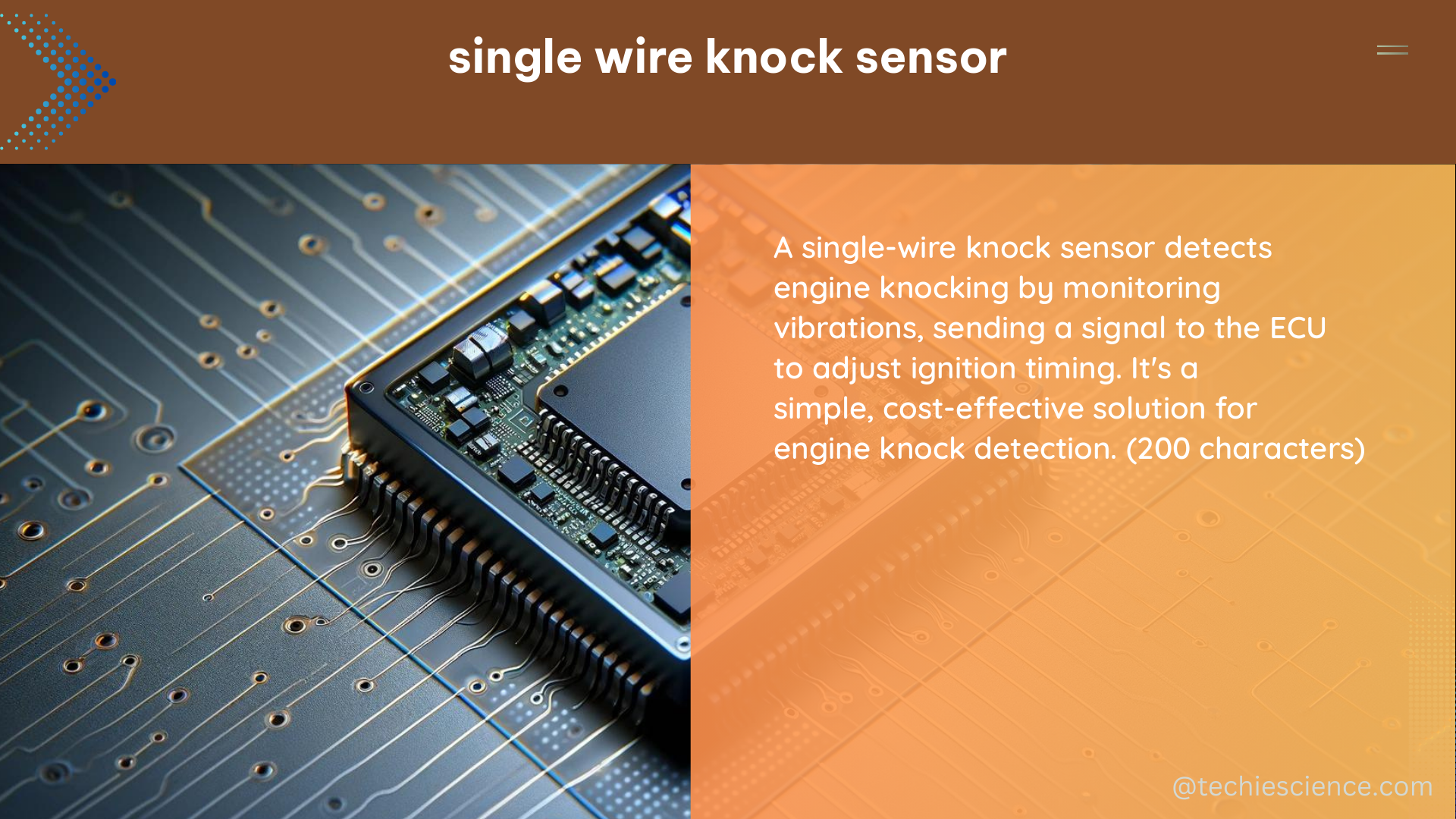A single wire knock sensor, also known as a piezoelectric knock sensor, is a critical component in modern automotive engines that detects engine knocking or detonation. This sensor generates a small voltage signal when it senses vibrations caused by knocking, which is then sent to the Engine Control Unit (ECU) for analysis and appropriate adjustments to engine timing and fuel delivery.
Understanding the Technical Specifications
The technical specifications of a single wire knock sensor can vary depending on the make and model of the vehicle, but there are some common characteristics:
- Resistance: The typical resistance of a single wire knock sensor is around 550,000 ohms.
- Bias Voltage: The ECU provides a bias voltage of approximately 5V to the knock sensor.
- Sensor Resistance to Ground: When the knock sensor is plugged in, the sensor resistance to ground will pull the 5V bias voltage down to around 2.5V.
- Voltage Indications: Higher voltages (above 5V) indicate an open circuit, while lower voltages (below 2.5V) indicate a short circuit.
Sensor Operation and Signal Generation

The single wire knock sensor generates its own signal and does not receive any signal from the ECU. Instead, the ECU monitors the difference in potential between the engine ground and the small voltage signal produced by the knock sensor.
When the engine experiences knocking or detonation, the vibrations cause the piezoelectric element within the knock sensor to generate a small voltage signal. This signal is then transmitted through the single wire to the ECU, which can then make adjustments to the engine’s timing and fuel delivery to mitigate the knocking.
Testing and Troubleshooting
Proper testing and troubleshooting of a single wire knock sensor are crucial to ensure accurate readings and proper engine performance. Here are some key steps to follow:
-
Wiring Considerations: It’s important to note that the single wire of the knock sensor is not shielded like the original equipment manufacturer (OEM) wiring, which can lead to false readings. This unshielded wire can pick up electrical interference, causing the ECU to misinterpret the sensor’s signal.
-
Testing Procedure:
- Probe the ECU pin for the knock sensor.
- Unplug the knock sensor connector and place a T-pin in the knock sensor’s terminal.
- Connect the red lead of a voltmeter to the T-pin and the black lead to the chassis.
- Set the voltmeter to AC mode and gently tap or vibrate the knock sensor.
-
You should observe a small voltage signal being generated, indicating that the sensor is functioning properly.
-
Voltage Interpretation:
- If the voltage reading is higher than the expected 2.5V, it may indicate an open circuit in the sensor or wiring.
-
If the voltage reading is lower than 2.5V, it may indicate a short circuit in the sensor or wiring.
-
Sensor Replacement: If the knock sensor is found to be faulty, it’s important to replace it with a genuine OEM part or a high-quality aftermarket equivalent to ensure proper engine performance and protection against knocking or detonation.
Conclusion
The single wire knock sensor is a critical component in modern automotive engines, responsible for detecting and reporting engine knocking or detonation to the ECU. Understanding its technical specifications, operation, and testing procedures is essential for maintaining optimal engine performance and preventing costly engine damage. By following the guidelines outlined in this comprehensive guide, you can effectively diagnose and troubleshoot any issues related to the single wire knock sensor in your vehicle.
Reference:
– https://www.scannerdanner.com/forum/scannerdanner-book-questions-and-discussion/2117-bias-voltage-on-a-single-wire-knock-sensor.html
– https://honda-tech.com/forums/honda-civic-del-sol-1992-2000-1/ways-testing-see-if-knock-sensor-dead-wiring-problem-701508/
– https://bobistheoilguy.com/forums/threads/how-does-knock-sensors-work.293982/
– https://maxima.org/forums/4th-generation-maxima-1995-1999/125237-knock-sensor-only-has-one-wire.html

The lambdageeks.com Core SME Team is a group of experienced subject matter experts from diverse scientific and technical fields including Physics, Chemistry, Technology,Electronics & Electrical Engineering, Automotive, Mechanical Engineering. Our team collaborates to create high-quality, well-researched articles on a wide range of science and technology topics for the lambdageeks.com website.
All Our Senior SME are having more than 7 Years of experience in the respective fields . They are either Working Industry Professionals or assocaited With different Universities. Refer Our Authors Page to get to know About our Core SMEs.